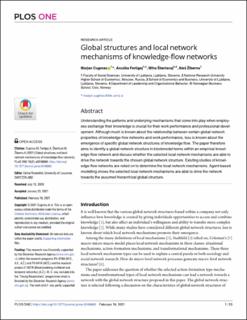Global structures and local network mechanisms of knowledge-flow networks
| dc.contributor.author | Cugmas, Marjan | |
| dc.contributor.author | Ferligoj, Anuška | |
| dc.contributor.author | Skerlavaj, Miha | |
| dc.contributor.author | Žiberna, Aleš | |
| dc.date.accessioned | 2022-06-20T13:48:47Z | |
| dc.date.available | 2022-06-20T13:48:47Z | |
| dc.date.created | 2021-02-17T12:54:47Z | |
| dc.date.issued | 2021 | |
| dc.identifier.issn | 1932-6203 | |
| dc.identifier.uri | https://hdl.handle.net/11250/2999657 | |
| dc.description.abstract | Understanding the patterns and underlying mechanisms that come into play when employees exchange their knowledge is crucial for their work performance and professional development. Although much is known about the relationship between certain global network properties of knowledge-flow networks and work performance, less is known about the emergence of specific global network structures of knowledge flow. The paper therefore aims to identify a global network structure in blockmodel terms within an empirical knowledge-flow network and discuss whether the selected local network mechanisms are able to drive the network towards the chosen global network structure. Existing studies of knowledge-flow networks are relied on to determine the local network mechanisms. Agent-based modelling shows the selected local network mechanisms are able to drive the network towards the assumed hierarchical global structure. | |
| dc.language.iso | eng | |
| dc.title | Global structures and local network mechanisms of knowledge-flow networks | |
| dc.type | Peer reviewed | |
| dc.type | Journal article | |
| dc.description.version | publishedVersion | |
| dc.source.volume | 16 | |
| dc.source.journal | PLOS ONE | |
| dc.source.issue | 2 | |
| dc.identifier.doi | 10.1371/journal.pone.0246660 | |
| dc.identifier.cristin | 1890858 | |
| cristin.ispublished | true | |
| cristin.fulltext | original | |
| cristin.qualitycode | 1 |
Tilhørende fil(er)
Denne innførselen finnes i følgende samling(er)
-
Scientific articles [2181]
